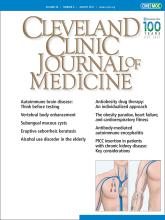
As a rheumatologist, I have the opportunity to see many patients in consultation for the evaluation of complex and often difficult-to-define symptoms. The buzzword referral diagnosis is frequently “autoimmune.” In 2021, autoimmune is seemingly the evil humor or miasma of centuries past revisited, with the added distinction that there are laboratory tests that can be ordered that, if positive, seem to provide superficial evidence for the validity of this diagnosis.
The problem is that many immune serologic tests are not specific for any defined clinical diagnosis and thus should not be used to drive therapeutic decisions. However, such testing may create significant angst and expectations in patients and their families. Indiscriminate testing often begets additional testing and specialty referrals. Obtaining an antinuclear antibody test in a patient with fatigue, brain fog, and diffuse pain as the primary symptoms—but with no diagnostically relevant basic laboratory testing or physical examination abnormalities—is invariably unhelpful to the patient1 and, if positive, is often emotionally and financially costly.
Many of the final diagnoses, even if these autoimmune tests are positive, are not autoimmune in nature. This is because many of these serologies have little specificity (poor positive predictive value). Within this bucket of autoimmune tests are rheumatoid factor and the antinuclear antibody test and related antibody tests (anti-SSA, anti-RNP, and even to some extent anti-DNA). In a second bucket are tests that detect antibodies pathogenically linked to specific clinical syndromes, such as anti-glomerular basement membrane antibody, linked to the glomerular basement membrane subset of Goodpasture syndrome; anti-AQP4, linked to neuromyelitis optica; and anti-acetylcholine receptor, linked to myasthenia gravis. These tests are of course also susceptible to misinterpretation (false positives) if ordered indiscriminately without the appropriate clinical context. But these antibodies do have a strong pathogenic link to specific clinical disorders.
Since truly pathogenic antibodies have been identified that cause or drive heretofore unexplained complex clinical syndromes, it is no surprise that research has moved toward trying to identify additional ones. There is hope in the scientific and patient communities that such identification can result in new approaches to molecular therapy.
The 2012 autobiography by Susannah Cahalan, Brain on Fire: My Month of Madness, and the movie based on it relate the intense story of a young woman ultimately diagnosed with anti-N-methyl-d-aspartate (NMDA) receptor-associated autoimmune encephalitis—a disorder with associated antibody that has a strong pathogenic link to clinical disease. Without knowledge of the antibody to the NMDA receptor, this disorder might still remain a mystery to diagnose, and a huger challenge to treat. In this issue of the Journal, Abbatemarco et al present a practical discussion of recognizing and managing patients with this and other forms of autoimmune encephalitis.
As a nonneurologist, I find these syndromes striking for several reasons. There is a biology that ultimately will be teased apart to explain how these specific antibodies sort to specific syndromes. It is fairly easy to conceptualize how antibodies binding to surface receptors can disrupt the function of the cells bearing those receptors and their associated intercellular networks. Perhaps careful clinical characterization of these syndromes will provide insight into further understanding of complex brain networking, specifically, what is the connection between characteristic focal facial seizures and encephalitis, or encephalomyelitis and sensory neuropathies? But we still have a way to go in understanding how antibodies recognizing intracellular targets are pathogenic, and why there are links between these syndromes and certain malignancies.
From the literature, I am not quite sure of the predictive value of these antibodies. For me, a takeaway from the article by Abbatemarco et al is that clinical suspicion for these rare syndromes should come first, followed by appropriate referral and subsequent thoughtful consideration for ordering these antibody panels from both blood and cerebrospinal fluid.
- Copyright © 2021 The Cleveland Clinic Foundation. All Rights Reserved.






